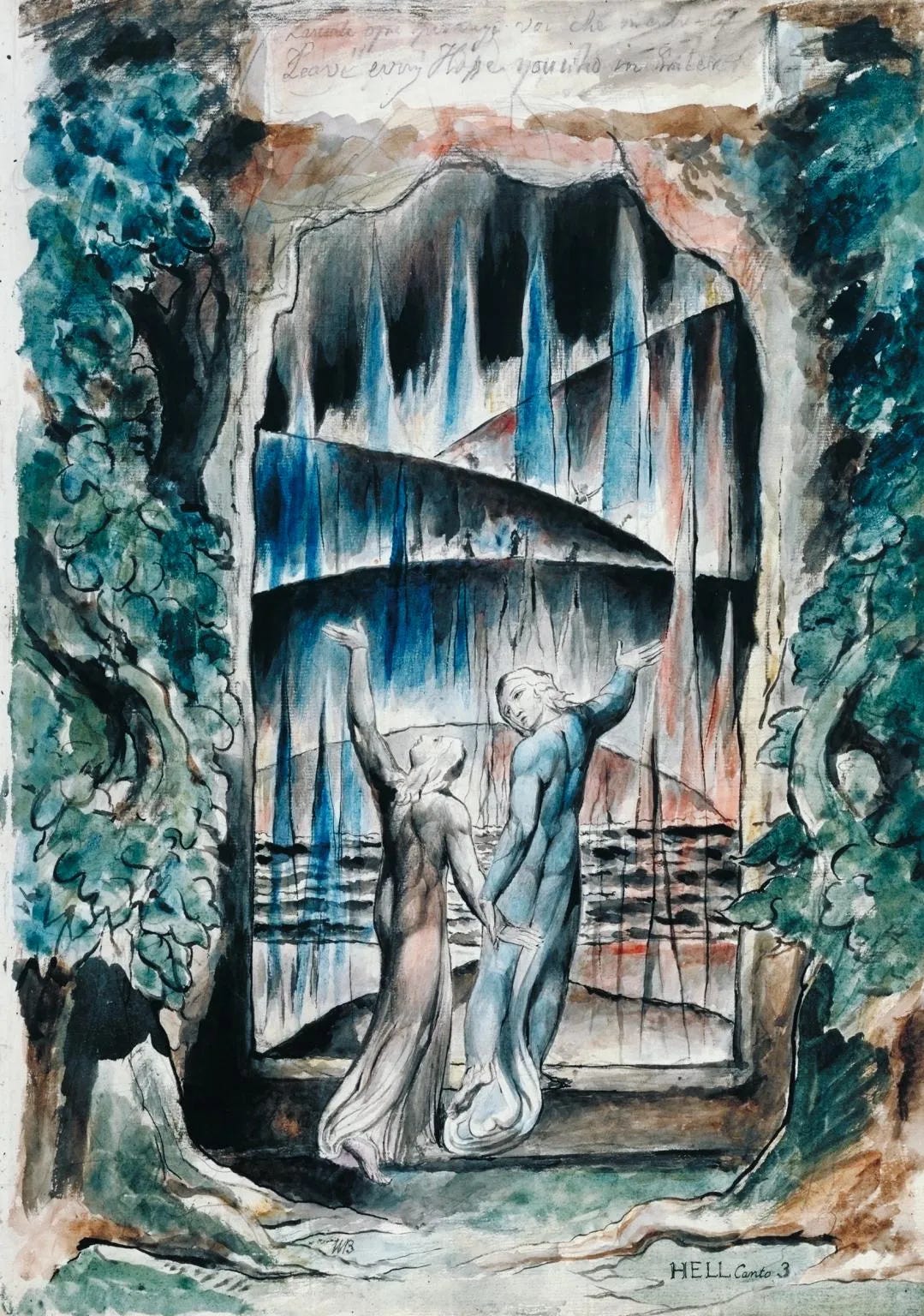Per me si va ne la città dolente.
Per me si va ne l’etterno dolore.
Per me si va tra la perduta gente.
[…]
Lasciate ogne speranza voi ch’intrate.
Canto III opens with a warning. Or is it an invitation?
The gate of Hell seems to come to life while a stern, disembodied voice tells the hopeless fate of those who come to pass through it as if to scare the pilgrim away. But if you ended up at the gate of Hell, is turning back still an option?
I love the great mystery that enshrouds the gate of Hell. While the memorable verse ‘Abandon every hope all you who enter’ (my translation) has been widely read as a warning, I’ve always read the opening tercet as an attempt to seduce. The anaphora has a chant-like quality (through me you go, through me you go, through me you go) as if it were trying to hypnotise the reader and lure them in. Not that Dante has any other choice at this point – like we saw last week, his pilgrimage must come to be because it has been willed in Heaven.
After a last word of encouragement from Virgil, who, almost in antithesis to the gate’s intimation to leave all hope at the door, reminds Dante that he must leave his doubts behind, the pilgrim steps into hell. In canto I and II we saw the narrator promise that he would relay everything he sees on his journey, so it is striking that the first impression of inferno we get is actually auditory. Verses 22 through 30 describe a soundscape characterised by a babelic confusion.
For context, the story of the Tower of Babel (which you can read here) is a frequently occurring theme in Dante’s work, particularly his writing on language (particularly his treatise on language de vulgari eloquentia). In the same way that God punished those who built the Tower of Babel for their arrogance by taking away their ability to communicate, the souls of Hell only emit desperate and unintelligible sounds. In fact, we will see throughout Inferno, that while Dante will at times speak to some of the damned souls he meets in hell, they don’t speak among themselves. Verbal communication, this uniquely human ability, is no longer available to those who have rejected the word of God.
After sound comes sight. Dante and Virgil are at the threshold of Hell, which holds the souls of those who have committed the sin of apathy. They have been sentenced to run around naked as swarms of wasps and hornets chase them for eternity. Their faces are streaked with blood from the thousands and thousands of punctures. They cry, their tears mingling with the blood and pooling at their feet, where maggots feed on them. I know what you’re thinking. This is a randomly elaborate punishment. Well, not quite.
The punishments of each group of sinners are decided according to the law of contrapasso. The only way I can define contrapasso is an infernal law of cause and effect. It’s like a law of nature according to which for every sinner’s crime there must be equal and fitting punishment. These punishments are usually metaphorically rather than literally related to their respective sins.
So here, the apathetic are the people who took their lives for granted. They never took a stand on anything, never fought for something they believed in. They were idle, passive, remained anonymous, they rejected the imperative to live one’s life. So because they were never bothered by anything in life, they are condemned to be eternally irritated in the most literal way possible.
In addition to this physical punishment, there is a more subtle psychological one, too. This is apparent in verses 58-60, where Dante describes one of the souls he recognised. He calls it ‘the shadow of the one who made, from cowardice, the great denial’, which Dante scholars have identified as Pope Celestine V, who abdicated after only five months in office. Notice how despite the real historical reference, and the admission that he clearly recognised him, Dante doesn’t name the man directly. This is because those who have refused to take initiative and make a name for themselves in life are not worthy of a name in death. Harsh.
As they press forward past the apathetic, Dante and Virgil come to a river. On the shore, legions of wretched should line up in an orderly fashion as if waiting for something. And soon enough, the reason becomes clear. Across the dark water, sailing his boat, comes Charon, the ferryman of Hell. This is the first of the demons/ gatekeepers of Hell Dante will encounter on his journey.
The character is inspired by a long classical tradition (the most relevant reference for us is his appearance in book 6 of Virgil’s Aeneid), as are the majority of the demonic creatures that populate Hell, either as guardians of the different circles or agents of torture.
Charon can tell that Dante is still alive and, like all other infernal monsters, tries to impede his journey. But of course, our trusty guide, Virgil, intercedes and passage to the first circle of Hell is granted. The canto closes with one of many tactical fainting scenes. Like I wrote in canto I, Dante does this whenever there’s some mysterious event that neither the science nor religious doctrine available to him at the time can explain. We’ll see it a lot - he faints, cries, falls asleep, loses sight, often and at very convenient times.




